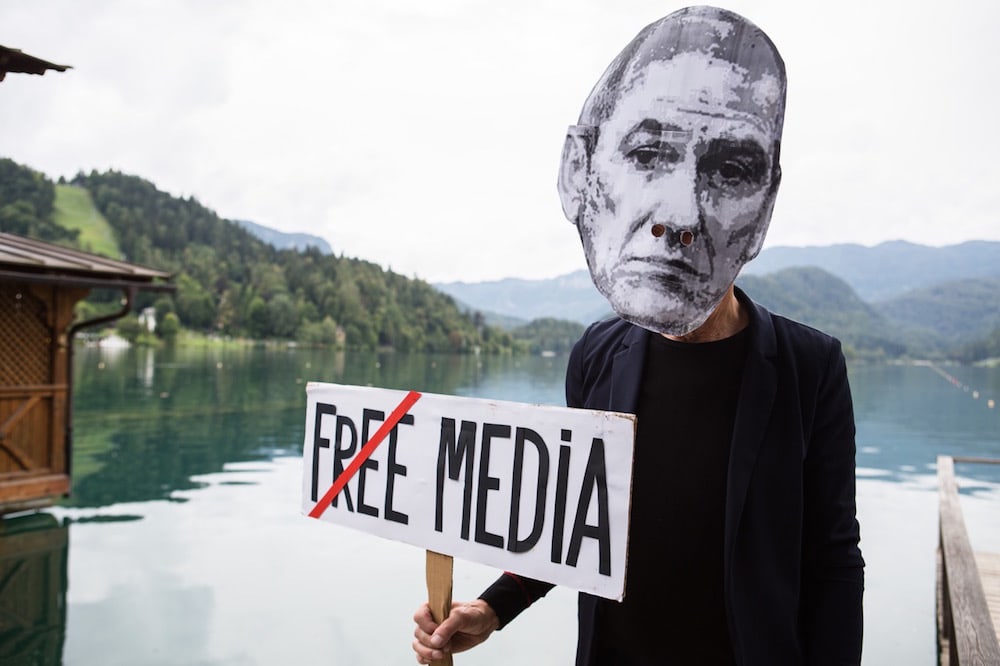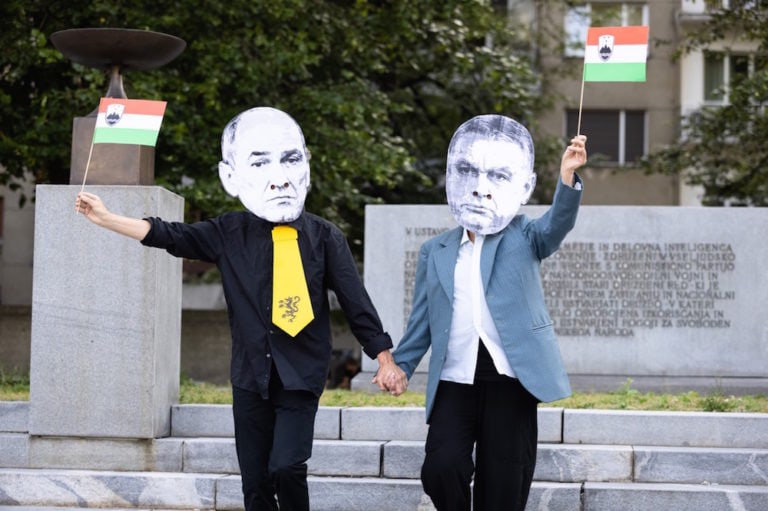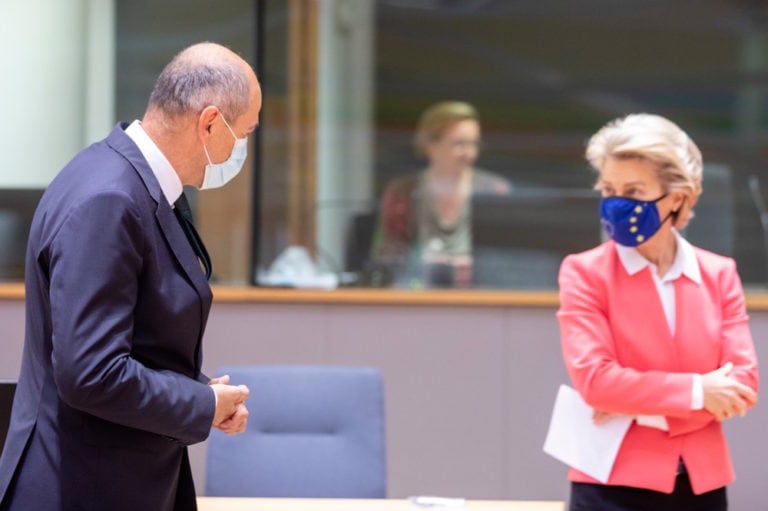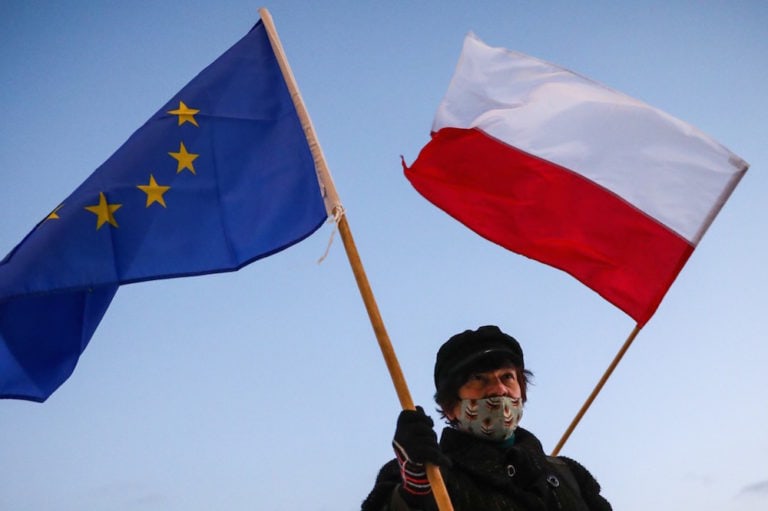In the last 6 months, Prime Minister Janez Janša - who took office in March 2020 and previously governed the country on two prior occasions - has renewed long-standing grievances with the press and denigrated critical media outlets.
This statement was originally published on ipi.media on 1 September 2020.
Few countries in Europe have experienced such a swift downturn in press and media freedom after a new government came to power than in Slovenia under veteran Prime Minister Janez Janša.
In the last six months, the outspoken PM, who took office in March 2020 and previously governed the country on two prior occasions, has immediately renewed long-standing grievances with the press and denigrated critical media outlets.
Going far beyond reasonable criticism, experts say, Janša has launched a series of vitriolic attacks on reporters on Twitter, enabling a wider increase in digital harassment from online trolls and contributing to an increasingly hostile climate for watchdog journalism.
Janša’s inflammatory attacks and his willingness to denounce critical reporting as #FakeNews have also drawn uncomfortable parallels with other leaders and brought Slovenia to the attention of press freedom groups, the OSCE and top EU bodies.
But the attacks on journalists do not end with social media abuse. Janša’s right-wing Slovenian Democratic Party (SDS) has again begun to try and exert greater influence over the country’s small media market as part of what it claims is an effort to promote greater media pluralism.
In addition to the introduction of legislation aimed at defunding the public broadcaster, Janša has also attempted to personally amplify his party’s pro-government media system, much of which are funded by Hungarian media linked to Viktor Orbán, who has dismantled media freedom and pluralism in Hungary over the past 10 years by pioneering a system of media capture inside the EU. These developments raise red flags about the possible export of the Orbán system of media control to Slovenia.
Taken together, this has culminated in a worrying decline in press freedom in a very short space of time in a country previously considered a relative safe haven for independent journalism, sending up further warning signs about deteriorating media freedom in Central Europe.
New Administration, Old Agenda
For many Slovenian journalists, however, the overriding feeling is one of déjà vu. As one of the most prominent figures within Slovenian politics in the last three decades, this is certainly not the first time 61-year-old Janša has courted criticism for undermining press freedom.
After serving as defence minister in Slovenia’s first democratic government following independence, he then went on to lead two administrations from 2004 to 2008 and from 2012 to 2013 before spending almost a year in prison on corruption charges, until his conviction was unanimously overturned by the Constitutional Court in 2015.
Throughout this turbulent career, he has been accused of censorship, abuse of state advertising, and faced an ongoing criminal case for calling two female journalists “washed-up prostitutes”. Propelled to office again in mid-March as the Covid-19 pandemic began, he and his administration have wasted little time in taking on perceived enemies in the media.
“History is repeating itself in Slovenia”, Anuška Delić a Slovenia-based journalist and founder of Oštro, a centre for investigative journalism in the region, told IPI. “Except this time around, SDS have taken the gloves off.”
Attacks on Media and Journalists Begin
“From the moment they took power, literally within days and during one of the worst crises we’ve faced, they started verbally attacking members of the media,” Nataša Briški, co-founder and editor-in-chief of Meta’s list and a former journalist at Slovenian outlet POP TV, told IPI. “The viciousness of the attacks is hard to comprehend and the number of attacks is growing, not decreasing.”
“What’s new is the extreme level of public bashing and smears,” Primož Cirman, founder and editor-in-chief of Slovenian investigative news website Necenzurirano, added. “Previous governments would of course be angry at coverage and there would be some level of criticism. But press freedom was respected. You didn’t have a situation where there are personal attacks on critical journalists.”
“In general, the climate has become much more adversarial,” Aljaž Pengov Bitenc, a Slovenian journalist, political analyst and co-host of several podcasts on media and politics, agreed. “The animosity between Janša, SDS and the media is long-standing, and the Prime Minister has turned denigrating the media into something of an art form.” (Pengov Bitenc is also a contributor to IPI’s Media Freedom in the Shadow of Covid reporting series.)
Much like the U.S. president, 280-character Twitter jabs are the main weapon here. “Criticism of the media during previous administrations was always there, but now we have Twitter, so it’s even more direct,” Marko Milosavljevic, an associate professor at the Department of Journalism in the University of Ljubljana, told IPI. “Fundamentally the press are seen by the Janša government as adversaries. The mentality is always be aggressive, always attack.”
Established outlets such as Dnevnik and Mladina are among the most common recipients. Soon after re-election, the prime minister also fired off tweets accusing left-leaning daily Delo of serving “deep-state tycoons”, adding the hashtags #FakeNews and #Presstitution after it criticised him. However, this animosity is often meted out to right-wing press such as the weekly magazine Reporter when it got on the wrong side of the PM.
In mid-March, a government account retweeted a claim that well-known investigative journalist Blaž Zgaga was an “escaped psychiatric patient”. Soon after he began receiving numerous online death threats and smears, drawing condemnation from the OSCE. When press freedom groups including IPI wrote to EU leaders over the pressure on Zgaga, Janša then retweeted an article suggesting the groups were under the influence of cocaine, while other criticism was labelled “fake news”. Foreign journalists have not escaped the prime minister’s ire either, with one journalist for Deutsche Welle being targeted on Twitter.
Long-Held Contempt for Media
Important for an international audience to understand here is where this contempt for much of the media comes from. “After independence from Communist rule in 1991, media in Slovenia began to be privatized and often it was moguls and tycoons from the previous regime that took over,” Cirman, of Necenzurirano, told IPI. “Since then, despite democratization and generational changes in structure, editors and journalists over the last 30 years, Janša has always seen the media as retaining residue from the Communist era and an inherent bias against him and his right-wing party.”
Under this view the current public broadcaster is the heir of the Yugoslav-era state media, he explained, while much of the mainstream media meanwhile represent a “deep state” legacy of Communism. For Janša the liberal press embody the spectre of cultural Marxism, which he recently described as the main ideological threat facing Europe. This latest “war with the media”, can therefore be understood as an attempt to rebalance what he sees as the biased development of the country’s media market, Cirman added.



